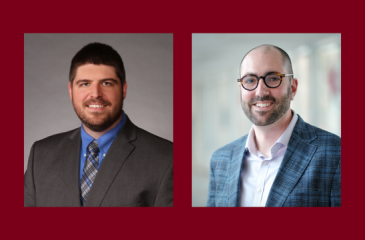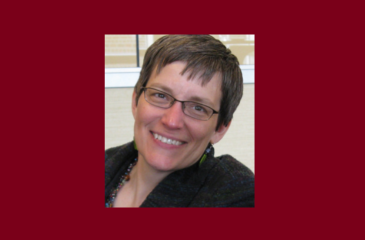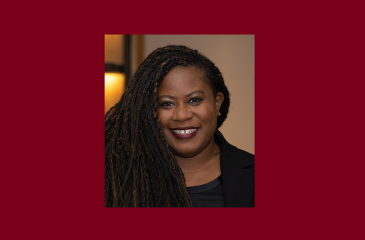Every October, bioethicists from across the country gather for the American Society for Bioethics & Humanities's (ASBH) annual conference.
We are pleased to announce that a number of our bioethics faculty members will be presenting this year. The conference theme, “Reimagining and Claiming the Role of Public Bioethics and Health Humanities”, is centered on these questions:
- How can we reckon with past failings and rebuild trust among diverse communities?
- How might the public face of bioethics continue to shift over the coming years?
- How can we recognize the connections between bioethics and the health humanities and use these intersections to propel us toward solutions to pressing public problems?
JOAN HENRIKSEN, PHD, RN, HEC-C | “ETHICS OASIS: CONNECTING CLINICIANS TO MITIGATE MORAL DISTRESS”
How can ethicists actively help our clinical colleagues with the stress and distress brought by COVID-19? In 2020, we implemented a virtual forum we call “Ethics Oasis” meant to allow clinicians to give voice to their experiences of caring for patients, families and each other in these times. Ethics Oasis offers a safe space to meet, see each other’s faces, and reflect on how we manage the gap between our ideals and our reality. Ethics Oasis is held twice a week for 50 minutes, online, facilitated by a clinical ethicist and a clinician. It is open to all patient-facing caregivers throughout our health system of multiple hospitals and clinics. It is designed to mitigate moral distress and promote interprofessional conversation and mutual support. Topics of discussion are determined by those in attendance; there is no didactic or curriculum. Sessions begin with ground rules and framing by the facilitator then it is opened for conversation. Participants have arrived at the oasis and shared many moral burdens. Topics discussed have ranged from guilt for leaving things undone to exhaustion from enforcing mask and visitor policies to feeling vulnerable when patients threaten violence. The breadth of themes is a testament to the challenges of being a caregiver and to the elastic nature of Ethics Oasis, holding space for most anything that people bring. This session will describe the Ethics Oasis program, themes that have emerged in it and will offer practical details and learnings from the nearly two years of implementation. Co-Author: Nancy O'Connor, M.D.
JAIME KONERMAN-SEASE, PHD | “MANAGING CHRONIC ILLNESS AND THE FAILURE OF EVIDENCE BASED MEDICINE”
“Management Conditions” is a common phrase in the realm of chronic illness. It is applied to concrete and well-understood diseases like diabetes to conditions whose existence are more controversial like fibromyalgia. The term “management” mistakenly conveys that, as Jeffrey Bennett writes in Managing Diabetes: The Cultural Politics of Disease, “the care of the self is easily executed” while suppressing nuanced understanding of its realities (Bennett, Jeffrey. 2019. Managing Diabetes: The Cultural Politics of Disease. NYU Press.). Many patients with management conditions feel abandoned by medicine - left without help to understand how to navigate their chronic illness. Evidence-based medicine’s emphasis on deploying techniques to treat (and ultimately cure) disease fails to attend to the complex social and political context that forms personal habits necessary for successful management. Communities fail to adequately accommodate the needs of those with chronic illnesses which leaves individuals facing insurmountable barriers without support. One solution within the clinic and community is to shift from deploying the right technique to forming character. Virtue formation, therefore, is essential to understanding how to care for people with “management conditions”. I use a historical approach to reimagine how we can better shepherd patients with chronic illness through the nuances of management conditions by drawing on the Hippocratic medical tradition as it was practiced in the long 18th century. By exploring a shift toward virtue formation at the individual and societal level, we can better care for those with chronic illness in our communities and our clinics.
THADDEUS MASON POPE, JD, PHD, HEC-C | “LEGAL UPDATE 2022: TOP 10 LEGAL DEVELOPMENTS IN BIOETHICS AND PUBLIC HEALTH”
Each year brings important legal developments related to bioethics. This panel will discuss the latest legal trends of significance for ASBH members. This annual panel has been well-attended and popular. This year’s panel will be interdisciplinary and diverse – in terms of topics covered and the speakers’ areas of expertise, geographic regions and institutional affiliations. In keeping with the conference theme, this year the panelists will address the many intersections of law with bioethics, public health and society through a review of the major legal developments in areas with a range of bioethical concerns in a changing landscape of judicial, legislative and administrative decisions and actions in bioethics-related law. Relevant recent legal developments will include those affecting our diverse communities, delineating challenges and potential paths forward for individuals, health professionals, and populations at the state, federal, and international levels. Panelists will cover thematic areas of interest to the wide and diverse areas of expertise of the ASBH audience, representing a breadth of key areas in law and bioethics. Major legal developments addressed include: Reproduction, assisted reproductive technologies, genomics and issues concerning vulnerable populations, e.g., individuals with disabilities; Aid-in-dying/Medically-assisted death, and withdrawal/withholding of life-sustaining treatment (including DNR and POLST orders); Brain death (including unilateral withdrawal of somatic support), futility, and informed consent/unwanted medical treatment/conscience claims; Public health law (including COVID-19), government regulation of behavior and research ethics. Co-panelists: Arthur Derse, MD, JD, Valerie Gutmann Koch, JD, Paul Lombardo, PhD
JOHN TILBURT, MD | “GOOD ETHICS AND BAD CHOICES: THE RELEVANCE OF BEHAVIORAL ECONOMICS FOR MEDICAL ETHICS”
Speakers in this panel will discuss a new book, Good Ethics and Bad Choices: The Relevance of Behavioral Economics for Medical Ethics(MIT Press, 2021).The book offers an analysis of how behavioral economics challenges fundamental assumptions in medicine and medical ethics about patient decision making and autonomy, as well as how its insights can be used in ethically defensible ways to improve patient decision-making through the use of nudges and choice architecture. It integrates the most cutting-edge research in behavioral economics and medical decision-making and analyzes nudging in several real and varied clinical contexts, including psychiatry, palliative care, pediatric critical care, fetal surgery, and prostate cancer decision-making Good Ethics and Bad Choices: The Relevance of Behavioral Economics for Medical Ethics is intended to be a conversation between ethics, behavioral economics, and the day-to-day practice of medicine. The panel reflects that aim: Panelist 1 (a philosopher) will briefly summarize the main arguments in the book that defend nudging in medical practice and will raise 3-4 “big picture” questions, considerations, or objections regarding the arguments. Panelist 2 (a decision science researcher) will discuss 3-4 big picture questions that the book raises regarding decision-making and shared decision-making research, policy, or practice. Panelist 3 (a physician) will discuss the implications of the book’s arguments for patient-physician interaction and communication. Panelist 4 (discussion moderator) will offer remarks and lead discussion with the audience and panel. Co-panelists: Jennifer Blumenthal-Barby, PhD, MA, Alex London, PhD, and Doug Opel, MD, MPH
IAN WOLFE, PHD, MA, RN, HEC-C | “THE ETHICS OF REFERRAL: ETHICAL AND PROFESSIONAL ISSUES IN PEDIATRIC QUATERNARY CARE”
Most children and adolescents with serious illness or medical complexity are treated at the nearest children’s hospital, which may vary dramatically in number of staffed beds, available specialties and specialty services, and physical location (freestanding or embedded in an adult facility). For an unknown proportion of these children, treatment choices will eventually include referral to one of a handful of very large, quaternary care children’s hospitals offering highly specialized or experimental interventions. Such a choice may be proposed by their local specialists, researched and pursued independently by their families, or both concurrently, and may be influenced as much by quaternary care centers’ branding and marketing campaigns as by physicians’ professional or parents’ social networks—and by their social and financial resources. Referral to a geographically distant center presents new complexity for families and clinicians. The process of informed consent becomes, deliberately or not, a shared effort between two discrete healthcare teams. Clinicians often discover that there are no consensus guidelines or even common expectations with regard to communication or documentation between the two teams and their respective institutions. Assumptions regarding standard practices or approaches or available resources may go unspoken but magnify misunderstandings; and while families of children with medical complexity may have a level of health literacy and sophistication far above the median, previous immersion in the culture of one hospital may generate a kind of culture shock when transferred to a new hospital. Together, these ethical and professional issues present an emerging challenge in contemporary pediatric ethics. Co-panelists: Amy Caruso Brown, MD, MSc, MSCS, Susan Gerik, MD, Bryanna Moore, PhD
IAN WOLFE, PHD, MA, RN, HEC-C | “WORKING AS A CLINICAL ETHICIST”
The Meet the Expert session is an opportunity for a small group of students, trainees, and early career individuals to meet with nationally-renowned experts in bioethics and health humanities in a friendly, casual setting during the Annual Meeting. The Meet the Expert program is not a forum for individual advising, but rather an opportunity to engage in an hour-long group conversation with other participants and the Expert.
JOEL WU, JD, MPH, MA, HEC-C | ““JUST THE FACTS MA’AM” – HOW (DE) CONTEXTUALIZING INJURY DATA FROM GEORGE FLOYD PROTESTS CONCEALS SYSTEMIC RACISM”
Norms in biomedical literature that seek to promote scientific neutrality and objectivity may also have the effect of concealing and accommodating systemic injustice. Data on injuries caused by police use of less-lethal weapons during the George Floyd protests has been published; however, editorial norms of medical journals have prevented authors from developing discussion about the societal, historical, and moral significance of the data. We suggest that there is no truly neutral way of presenting data on the injuries caused by the law enforcement response to George Floyd and BLM protests across our country. Decontextualized data will be subsumed by, and incorporated into a dominant narrative. Without additional information, it is easy to tacitly accept the dominant narrative that favors police accounts of their actions, ignores the systemic causes of racial inequity, and dismisses the compounding effects of individual and continuous historical trauma. Context – whether at the historical, societal, or individual level – provides the requisite background information to interpret data in ways consistent with both truthfulness and justice. Bioethics and medical literature should confront the illusion of neutrality, and allow researchers to place the results of their work into societal and historical context. Explicitly placing medical data into historical and societal context denies the dominant narrative the automatic privilege of disregarding the existence of systemic racism. Furthermore, explicitly framing the data in a counternarrative can validate and substantiate the lived experiences of oppressed and marginalized groups whose voices and experiences have largely been underrepresented in biomedical literature. Co-Authors: Brooke Cunningham, MD PhD; Erika Kaske, BS; David Satin, MD
JOAN HENRIKSEN, PHD, RN, HEC-C | CO-AUTHOR ON PAPER PRESENTED BY JOAN MADDEN, MD, HEC-C FOR “LOCKDOWN KEPT US APART - ETHICS CASE FORUM BROUGHT US TOGETHER”
In 2020, when our hospital quickly pivoted from in-person to virtual ethics committee meetings, we realized that ZOOM may have handed us a golden opportunity to bring together the larger “ethics family” serving the hospitals within our network. We designed an “Ethics Case Forum” to serve both educational and community-building functions across a large, geographically dispersed hospital network. We will describe the program, its key advantages and some learnings. Our healthcare system includes twelve hospitals, only one of which has a full-time professional ethicist on staff. The other hospitals rely on interdisciplinary volunteer committees. The distances between hospitals precluded regular in-person meetings, but monthly virtual meetings over the lunch hour proved to be ideal. Our ethicist established the Forum, coordinates and mentors case presenters and helps facilitate the sessions. The Forum is not a decision-making or quality review body, but a safe space for spirited discussion, mutual support and continuing education. While there is not a formal didactic agenda, education was one of the main motivations in designing the Forum. Knowledge and skill building are provided gently and persistently as cases are presented and discussed each month. One of the hospitals presents a recent case, highlighting a selected theme, for example: family care conferences, truth telling, uncooperative patients, and provider obligations in the face of demands for treatment thought inappropriate. Our 2022 goal is to extend participation from the current five hospitals to all twelve.
JON TILBURT, MD | CO-AUTHOR ON PAPER PRESENTED BY OMAR KAWAM, BA FOR “(MIS)TRUST IN MEDICINE: A QUALITATIVE ANALYSIS OF PATIENTS SEEKING UNPROVEN STEM CELL INTERVENTIONS”
Mistrust of the medical establishment has made patients more susceptible to misinformation, suspicious of physicians' recommendations, and willing to try scientifically unproven and unregulated therapies. These trends hold prominence in the unproven stem cell industry where vulnerable, out-of-option patients seek support for their conditions outside traditional care settings. In alignment with the conference theme of rebuilding trust, we chose to examine a case example of (mis)trust among patients seeking unproven stem cell interventions (SCIs) and identify strategies to rebuild trust. We conducted 29 interviews with patients and families all of whom are interested in SCIs. Preliminary analysis of themes illustrates how mistrust in the medical establishment influences patient interest in unproven SCIs. Most individuals who expressed a high likelihood in acquiring unproven SCIs believe they have exhausted their healthcare options and are disappointed by what they perceive as the slow pace of medical research. Some believe the medical establishment and pharmaceutical companies are not investing in stem cell therapeutics because they cannot ensure profits. Additionally, most high SCI seeking patients expressed little regard for warnings about unproven SCIs from the US Food and Drug Administration. Conversely, these patients trust for-profit providers that offer glimmers of hope through unproven treatments, falsely represent pioneering research in alternative therapies, and provide emotional support. We suggest several promising intervention strategies to address patient mistrust in the medical establishment including acknowledging patient grievances and frustrations with healthcare, improving clinician-patient communication about unproven therapies, and developing more accessible mechanisms to enroll patients into legitimate experimental options. Co-authors: Xuan Zhu, PhD; Charlene Martin-Lillie; Erin Gillmore; David Eton, PhD; Lila Rutten, PhD; Shane Shapiro, MD; Jon Tilburt, MD; Zubin Master, PhD
JOEL WU, JD, MPH, MA, HEC-C & RACHEL HARDEMAN PHD, MPH | CO-AUTHORS ON PAPER PRESENTED BY ERIKA KASKE, BA FOR “THE LANGUAGE OF LESS-LETHAL WEAPONS: EUPHEMISM, POLICY, AND HEALTH EQUITY”
It has been two years since we observed the policing of the George Floyd protests in the United States. Multiple injury reports emerged in medical journals, and the scientific community called for law enforcement to discontinue the use of less-lethal weapons. Despite progress in research, policy change has not followed a similar pace. Although reasons for this discrepancy are multifactorial, much of the language used to describe less-lethal weapons minimizes their effects and may accommodate inappropriate use. In the United States, this is something we must consider within the context of the Black Lives Matter (BLM) movement and an ongoing and continuous struggle for racial equity and justice. Less-lethal weapons were used by police throughout the Civil Rights Movement of the 1950’s-1960’s. Less-lethal weapons were disproportionately used during BLM protests. People protesting structural racism, largely consisting of black lives, suffered the harms. Altogether, this reveals how these weapons contribute to health inequities and systemic racism. In this session we argue that (1) euphemisms within the language of less-lethal weapons such as “rubber bullets,” “bean bags,” and “tear gas,” make the weapons sound less dangerous (2) there are racial disparities in police use of force, including use less-lethal weapons in public demonstrations and (3) the harm-minimizing language of less-lethal weapons should be replaced with more accurate harm-acknowledging terms so that policymakers and the public can make more informed decisions. Co-authors: Joel Wu, JD, MPH; Rachel Hardeman, PhD, MPH; David Darrow, MD, MPH; David Satin, MD



